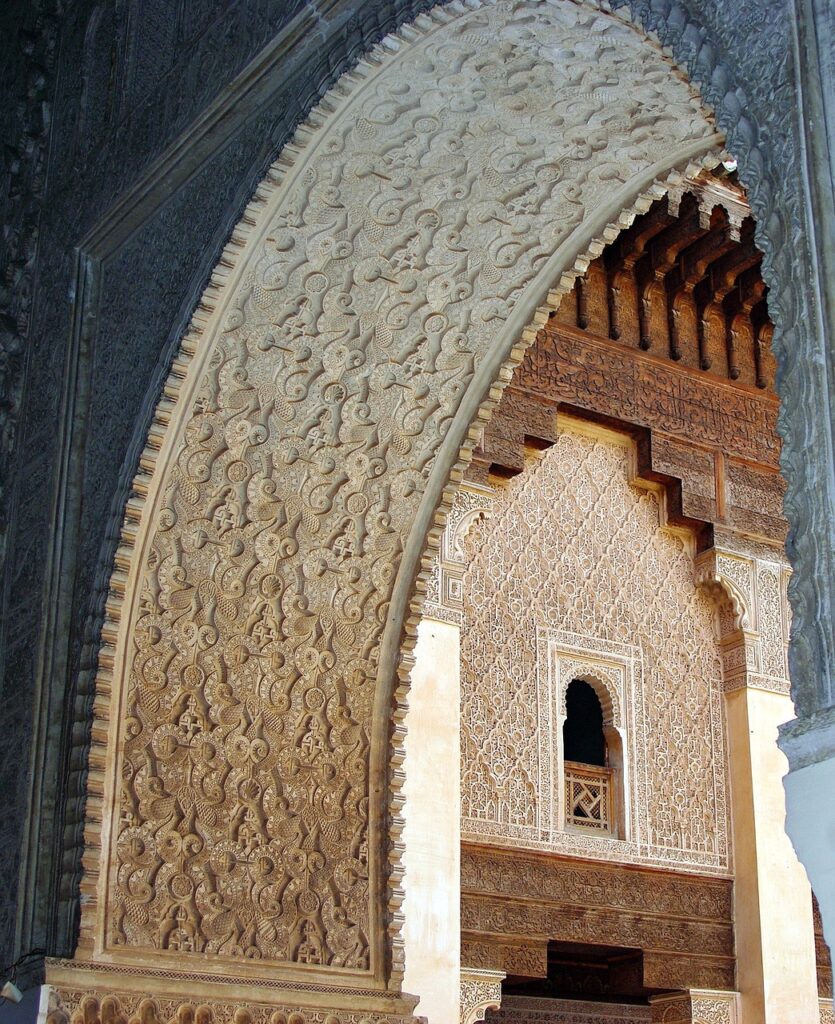
Culture and Customs of Morocco
Magical Morocco will mesmerize you with its myriad colorful motifs and most of them lie embedded in the rich culture of Morocco. Throughout the ages, numerous races have come down to Morocco from the various corners of the world and have been absorbed into the mainstream of Moroccan society. Their particular customs, traditions and beliefs have influenced Moroccan culture, giving it a unique multi-cultural identity.
Religion:
Islam is the official religion of Morocco, but the coexistence with other religions is perfect (the practice of other revealed religions is also guaranteed by the constitution). The day is punctuated by five calls to prayer. It is the Muazzin who announces them at the top of the minaret. During the month of Ramadan, the Moroccans fast, stop drinking and smoking from sunrise to sunset. Obviously, their day is modified. Most governments, utilities, buildings and stores adjust their schedules.
However, non-Muslims are to eat in certain restaurants, particularly in hotels. The days drag on but the nights are beautiful!
Language:
Moroccan culture is also praised for language diversity. apart from classical Arabic, the language of education, administration and media, the daily language in Morocco is Arabic dialect, Tamazight (Berber) which spoken in the Rif, the Atlas, and the Souss and it varies by region. Most Moroccans speak French, many speak Spanish and English.
Arts and Crafts:
Exquisite is one word that aptly describes the artistic works of Morocco. The Moroccan artisans are known all over the world for their intricate woodworks, most of which are sculpted and painted ornately. The colorful and the beautifully adorned pottery done by the Berber people of Morocco are also very popular amongst the tourists.
However, amongst the various handicrafts of Morocco, it is her lovely carpets that will leave you wonderstruck. Every carpet has a story to tell about one particular aspect of Morocco culture and her people.
Music and Dance:
The multi-ethnic character of the culture of Morocco is nowhere more evident than in her music and dance forms. The predominantly Arabic population in Morocco has given its music a mellifluous Arabic tone but you can also detect significant Andalusian strains in Moroccan music.
Besides you have in Morocco the village and ritual music brought on by the Berber people, the rock- influenced Chaabi music, the Algerian Gharnati form of music and the languorously mystical Gnawa music of the Sub-Saharan people.
There are also many dance forms prevalent in Morocco, the most prominent amongst them being the Guerda Dance, the Casbah Dance and the very exotic and the very enchanting Belly Dance.
Know Moroccan Culture:
Showing respect to local customs is to demonstrate a basic courtesy to a welcoming country.
To avoid any embarrassing situations and misunderstandings, we should act according to some basic rules:
In Morocco, access to mosques and holy places is forbidden to non-Muslims. Some exceptions: Mosque Hassan II in Casablanca, Mohamed V Mausoleum in RabatMausoleum, Moulay Ismail in Meknes,Moulay Ali Cherif Mausoleum at Rissani.
Explore Moroccan cultural heritage:
To know the Moroccan cultural heritage crosses by a wink in history, geography, fauna, flora, colours, sounds, images and their expression among Moroccans. This knowledge also passes by a thorough work and a difficult glance on the other borders which will make complete the route of initiation or cultural prospecting. In a wide meaning, culture can approach sectors and take into account naturally various cultural aspects in their process of elaboration and production: broadcasting, regional development, employment and training, research and development, information and communication, tourism and the company.
Explore Moroccan Museums:
Tangier Tetuan Meknes Rabat Fes Marrakech
Museum of moroccan arts dar el Makhzan: collections from different regions archéological museum : superb roman mosaïc of Trois Grâces Museum Dar Jamaï archéological museum Musée of Oudayas : carpets collection Museum Dar Batha : marocan ceramics Museum Dar Si Saïd .
Morocco counts museums which group together objects culturally and scientifically of high importance. These objects teach on prehistoric Morocco, crossroads of civilizations, steelyard, Berber or Arabic. Sites of high scientific content deliver regularly secrets on the fact what was the life, the fauna and the flora, through millions of years.
for more information :
marrakechtourdesigner
